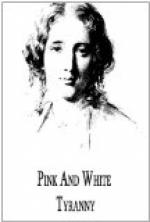They had both been very silly, he said; and the next step to being silly very often was to be wicked. For his part, he thought she ought to be thankful for so good a husband; and, for his own part, he should lose no time in trying to find a good wife, who would help him to be a good man, and do something worth doing in the world. He had given people occasion to say ill-natured things about her; and he was sorry for it. But, if they stopped being imprudent, the world would in time stop talking. He hoped, some of these days, to bring his wife down to see her, and to make the acquaintance of her husband, whom he knew to be a capital fellow, and one that she ought to be proud of.
Thus, by the intervention of good angels, the little paper-nautilus bark of Lillie’s fortunes was prevented from going down in the great ugly maelstrom, on the verge of which it had been so heedlessly sailing.
Harry was not slow in pushing the advantage of his treaty of friendship with Rose to its utmost limits; and, being a young gentleman of parts and proficiency, he made rapid progress.
The interview of course immediately bred the necessity for at least a dozen more; for he had to explain this thing, and qualify that, and, on reflection, would find by the next day that the explanation and qualification required a still further elucidation. Rose also, after the first conversation was over, was troubled at her own boldness, and at the things that she in her state of excitement had said; and so was only too glad to accord interviews and explanations as often as sought, and, on the whole, was in the most favorable state towards her penitent.
Hence came many calls, and many conferences with Rose in the library, to Mrs. Van Astrachan’s great satisfaction, and concerning which Mr. Van Astrachan had many suppressed chuckles and knowing winks at Polly.
“Now, pa, don’t you say a word,” said Mrs. Van Astrachan.
“Oh, no, Polly! catch me! I see a great deal, but I say nothing,” said the good gentleman, with a jocular quiver of his portly person. “I don’t say any thing,—oh, no! by no manner of means.”
Neither at present did Harry; neither do we.
CHAPTER XXIV.
SENTIMENT v. SENSIBILITY.
The poet has feelingly sung the condition of
“The banquet hall deserted,
Whose lights are fled, and garlands dead,”
&c.,
and so we need not cast the daylight of minute description on the Follingsbee mansion.
Charlie Ferrola, however, was summoned away at early daylight, just as the last of the revellers were dispersing, by a hurried messenger from his wife; and, a few moments after he entered his house, he was standing beside his dying baby,—the little fellow whom we have seen brought down on Mrs. Ferrola’s arm, to greet the call of Mrs. Follingsbee.




